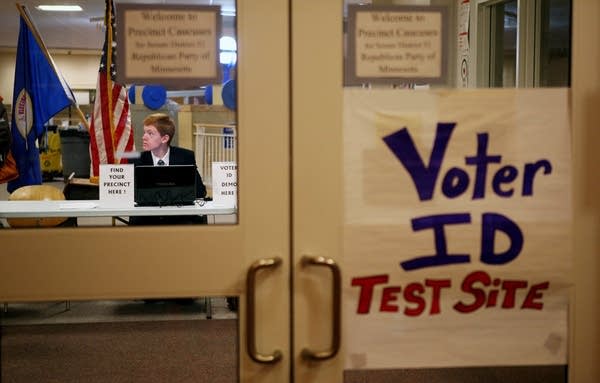'Many years of litigation' ahead if Voter ID passes
Go Deeper.
Create an account or log in to save stories.
Like this?
Thanks for liking this story! We have added it to a list of your favorite stories.

This week's Minnesota Supreme Court ruling on the proposed voter ID constitutional amendment resolved one legal challenge, but more are likely to come.
Supporters and opponents of the proposed requirement that all Minnesotans show photo identification at the polls say those potential lawsuits will only come if voters approve the amendment on Election Day.
In their lengthy opinion affirming the ballot question wording, four of six Supreme Court justices stressed that they were expressing no opinion on the merits of the proposed changes in state election law. But they might still get a chance to do so.
"If this passes, if this makes it into our Minnesota Constitution, I think we will have many years of litigation and possibly many lawsuits," said state Rep. Steve Simon, DFL-St. Louis Park.
Turn Up Your Support
MPR News helps you turn down the noise and build shared understanding. Turn up your support for this public resource and keep trusted journalism accessible to all.
Simon was a vocal opponent of the Republican-backed voter ID legislation that DFL Gov. Mark Dayton vetoed, and the subsequent constitutional amendment bill that allowed the GOP to bypass the governor and put the measure directly on the ballot. If it passes, Simon said there could be a series of lawsuits challenging the requirement before it would take effect in 2013.
"A second series of lawsuits, I would suppose, would come along after implementation of the law. That is after an election has already taken place under the new regime," Simon said. "There would be, I suspect, lawsuits about that, about the sort of impacts of that on certain communities and certain populations."
Those potential impacts include voter disenfranchisement, which would raise constitutional issues for a federal court to sort out. In 2008, the U.S. Supreme Court upheld Indiana's voter ID law in the case known as Crawford v. Marion County Election Board.

Chuck Samuelson, executive director of the American Civil Liberties Union of Minnesota, said he thinks there could still be a federal lawsuit challenging the constitutionality of Minnesota's voter ID amendment once an election is held under the new requirements and once a voter gets turned away.
"Their argument in the Indiana case was quite simple: 'If you want to sue, bring us somebody who's damaged, who's been injured by this. They can sue. But if you haven't been injured by this bill, you can't sue,'" Samuelson said. "That's the federal position in the Crawford case. So, that's going to require the election to be held and somebody to be disenfranchised."
Voter ID supporters insist that all eligible Minnesotans will still get to vote under the new requirements. But they too are expecting additional lawsuits. Dan McGrath, executive director of the election watchdog and pro-amendment group Minnesota Majority, said he doesn't think there will be any legal challenges before Election Day, but he expects them to come later.
"If the voter ID amendment is enacted by the voters then it's going to be up to the Legislature to rewrite some statutes to come into compliance with the constitutional requirements," McGrath said. "It's likely that we'll see some additional legal challenges over the nature of those statutes, as to whether they comply with the constitution or not."
McGrath said he is confident that the Legislature will craft a constitutionally solid bill to implement the voter ID requirement, and that the courts would eventually dismiss any lawsuits.
Sen. Scott Newman, R-Hutchinson, one of the chief sponsors of the amendment bill, said he hopes to be involved in writing that enabling legislation next year. Newman said he plans to follow closely the ruling in Indiana's Crawford case.
"If you follow Crawford when you're drafting this legislation, I really think you're going to be OK, because the U.S. Supreme Court has already put their stamp of approval on it."
Newman said he thinks the bill will be on solid constitutional ground if it provides a reasonable way for people who show up without an ID to a cast provisional ballot, and if the state provides a free ID to anyone who needs one.



